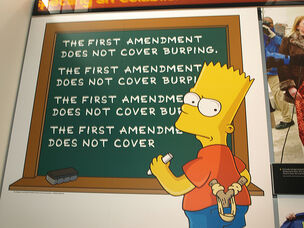
Help yourself, help each other, learn stuff[]
A combination study guide and extra-credit opportunity for student's in Dan Weissmann's section of Introduction to Journalism at Columbia College Chicago, fall 2010. (More details below.)
First Round of Entries: Tier 1[]
We've got four categories here. Click on any of the following for a table of contents.
1. Media Law
2. Ethics
4. Terminology
*New!* Tier 1.1: Public Relations[]
Some terms and stories likely to show up on the final exam. Have a go, if you like:
a. Ivy Lee, John D. Rockefeller, and the Ludlow Massacre
b. Video News Releases
c. The Big Lie
d. Freebies
e. Exclusives
The big idea:[]
Together, we're going to compile the best-est, most comprehensive and most helpful guide possible for the concepts, topics and facts that get discussed in this course. This is the kind of thing that could show up on a final exam, or the kind of knowledge you'll be expected to have as you write papers, participate in class discussions, etc.
I'm getting us started, setting up categories and templates. You'll add the content-- and edit each other's work. The first round was a homework assignment. Everything after that is extra credit.
Extra credit basics[]
Each Wiki article is assessed on a 20-point scale (below).
Contributing 10 points worth of value to the Wiki is worth a 1% bump on your final grade for the semester.
You can contribute any number of points to any article that's open for business. (Not all articles will be open for business at all times. Scroll down for details.)
There is no limit to how much extra credit any one person can rack up.
I will do my best to make sure that there are enough articles so that there is effectively no limit to how much extra credit the class as a whole can rack up.
We will work in batches (or tiers): Until every article on Tier 1 is filled to at least 90 percent capacity, no credit will be awarded for work on Tier 2 or other Tiers.
So everybody will have an incentive to contribute as much as possible, as quickly as possible, to the Wiki.
How to earn extra credit.[]
The short version: Every time you visit, or create, an article, leave a comment with your estimate of (a) what the article is worth on our 20-point scale at the time you logged in, what it still lacks in order to be a full 20-point article and (b) what it's worth after you're done editing. And specify what changes you're making and why they're worth what you say they are. I'll be checking to see if I agree with your estimates and awarding credit appropriately.
The details:
1. FIRST: Sign in! Otherwise nobody will be able to give you credit for the work you've done.
2. Now, pick a term from the list above, and go to the page behind it.
3. When you arrive, assess what's there, based on the 20-point scale below. (If it's blank, we're at zero; if it's perfect, we're at 20.)
4. Decide what you're going to contribute to this article.
5. BEFORE YOU START: Scroll down to the bottom of the page and declare your assessment and your intention. (Example: "I think this article currently stands at 10 points. The definition, so-what, examples and citations are all there. But there's no image, the spelling and grammar suck, and there's nothing that goes beyond what was covered in the textbook or in class. I'm going to copy-edit and add an image, adding 5 points of value here.")
6. Execute your edits: Add anything that's missing, correct errors (both of substance and mechanical errors), etc.
7. HIT "SAVE PAGE" to save your work!
8. Assess your progress: Did you do everything you planned? Successfully? Did you go beyond what you thought you would achieve?
10. Go back to the comments section and note your assessment of your own work. ("I think I nailed the copy-editing, but there's probably a better image out there, if someone takes the time to find it. So I added four points, and we're at 14 here.")
9. If you think the article now is at least 90 percent done (18 of 20 points), send me a note, so I can review it.
10. Edit more pages!
How points work-- a rubric for a Wiki article[]
I still owe you My priority list-- it'll have at least two tiers of entries. (And here's a new twist: until everything on Tier 1 has reached, say, 17 points, there's no credit available for work on Tier 2 entries. This way, we make sure that the top priorities are getting our attention first.)
1. What does this mean in a journalism context? 1 pt.
2. Why does it matter? 2 pts.
3. What are some specific examples or applications? 3 pts
4. Link to resources for citations; all factual claims supported by citation 4 pts
5. Extend the article beyond the textbooks and our class discussion: being up facts not mentioned, explain why they're important and how they change or complicate the ideas already covered. 5 pts
6. Grammar, spelling, punctuation 3 pts
7. Add at least one image that appropriately illustrates the article. 2 pts
Articles/Topics on Hold for Now[]
These were created as part of the Wiki homework assignment; they're really categories that should have lots of articles underneath them, but I didn't mark them clearly enough the first time. We'll get to them with Round 2.